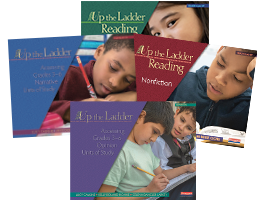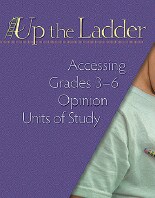Up the Ladder Reading and Writing

“Nothing matters more than the mission of giving all young people access to the beautiful, important work that happens in reading and writing workshops.”
— Lucy Calkins
How do you support upper-grade and middle school readers if they are new to the norms and culture of reading workshop, particularly if they may also have missed some foundational instruction in reading fiction and nonfiction? How do you do this in a way that builds a strong reading community and strong habits and routines? How do you approach all this if you are new to the teaching of reading workshop? The Up the Ladder Reading units offer a very good place to start.
The Up the Ladder Reading units (one unit for reading fiction and one for reading nonfiction):
- begin with the clear expectation that students are in charge of their own reading lives;
- stress agency and independence across sessions;
- teach students to recognize and select a just-right book, to notice and flag parts of the text while reading, and to engage in conversations around the texts they are reading;
- help students build essential skills such as fluency, envisioning, prediction, making deeper inferences, and finding main ideas.
Up the Ladder Reading and Writing
The new Up the Ladder units are designed for children in grades 3–6 who may not yet have had many opportunities to practice writing narrative, information, and opinion pieces, or might not have had those experiences in workshop-style classrooms. The units give these children opportunities to engage in repeated successful practice and to move rapidly along a gradually increasing progression of challenges. Frequent checkpoints channel kids to double-check that their work has gotten substantially better. At each of these checkpoints, they—and you—will see that their growth has been dramatic.
The Up the Ladder Units:
- give novice writers intense writing practice within a short timeframe
- teach foundational strategies through content, topics, and mentor texts that are appropriate for grades 3–6
- include concise, accessible student checklists and guidelines for daily assessment
- support teachers with an introduction to the workshop framework and writing process, along with tips and strategies for classroom management
- include video demonstrations of the minilessons by Lucy Calkins and TCRWP staff developers to support teacher preparation
- offer teachers specific ways to support English learners
- engage young people in work that is demanding yet attainable
- ensure that students make rapid and dramatic progress toward grade-level writing work.
While the Up the Ladder units are designed to be precursors to the grade-level Units of Study in Opinion, Information, and Narrative Writing, 3–6, they also can be helpful in a variety of instructional settings, including summer school.
Components
- Three Up the Ladder Units: Narrative, Information, Opinion
- A Guide to the Up the Ladder Units
- Online Resources including video demonstrations for every minilesson
- Large-format Anchor-Chart Sticky Notes
Authors

Lucy Calkins is the author of the popular firsthand classroom materials Units of Study for Primary Writing and Units of Study for Teaching Writing, Grades 3–5, as well as several companion resources for literacy coaches and principals. Most recently, Lucy has published a curriculum for the reading workshop, Units of Study for Teaching Reading, Grades 3-5, and she has written the Common Core Reading & Writing Workshop series for Grades K–8.
In addition, Lucy is the author or coauthor of numerous foundational professional texts with Heinemann, including Pathways to the Common Core;The Art of Teaching Writing; and One to One. She is also the author of The Art of Teaching Reading.
She is the Founding Director of the Teachers College Reading and Writing Project at Columbia University's Teachers College. For more than twenty-five years, the Project has been both a think tank–developing state of the art teaching methods–and a provider of professional development. In these capacities, the Project has supported hundreds of thousands of educators.
As the leader of this world renowned organization, Lucy works closely with policy-makers, superintendents, district leaders and school principals to instigate and sustain school-wide and system-wide educational reforms. But above all, Lucy works closely with teachers and with their classrooms full of wise and wonderful children.
Lucy is also the Richard Robinson Professor of Children's Literature at Teachers College, where she leads the Literacy Specialist program.
Lucy and her husband John are the parents of two sons, Miles and Evan.
